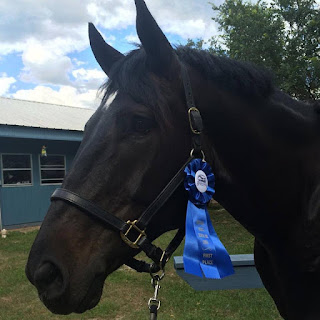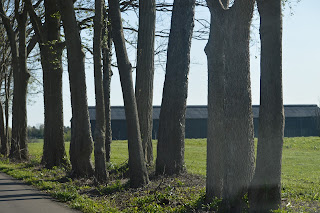Hurricane Harvey hit Texas last week with devastating effects that will take years to recover from. The only good news was that the people learned their lessons from Hurricane Katrina and animals had more of a priority in evacuations this time around. The downside was that horses, cows and other livestock were not quite so lucky. While many horse owners did evacuate, there were those who were caught off guard and to this day, animals are still be rescued from the floodwaters.
With Hurricane Irma looming not so far off the coast of Florida, with no definitive set landfall location, it is encouraging to see that many horse owners are being proactive now and ready to evacuate. There are two excellent facebook sites:
These sites provide excellent resources for anyone needing to evacuate or for those with trailers and stabling to offer.
Remember! Better safe and sorry. You cannot wait until the last minute to evacuate with horses and livestock.
This is a repeat of a blog that I wrote a few years ago. As the DC for our pony club, I would invite the local fire department to come out to the barn every year and talk about disaster planning. On a side note, every farm owner should invite their local firemen to come out to the barn. They will inspect your barn and tell you what improvements need to be made. They will also welcome the opportunity to learn how to halter and lead horses, something which could someday save the life of your horse.
 Disaster Planning
Disaster Planning
Blizzards in October. Hurricanes and flooding in Vermont. Tornadoes in the mountains. Sound like the latest disaster movie? No, unfortunately, that was the weather pattern last year in the United States. Hundreds of people and countless animals were killed, injured and left homeless. Ironically, Florida was one of the few states to not experience a natural disaster in 2011. But don’t let our quiet year fool you. That just means we are one year closer to our next big disaster. Will it be 2012? There is a good chance that we will be affected by a hurricane or tornadoes. We are already in a drought and experiencing wild fires.
No matter where you live, you need to have a disaster plan, not only for your home, but for your horses. Do you?
It isn’t that hard to plan one. The first thing you need to do is to identify what type of disasters your area may be subjected to. For Floridians, that means hurricanes, flooding, tornadoes and wildfires. Unfortunately, we don’t have much notice to inact an emergency plan with the
latter two, so it is all the more important to know what to do when Mother Nature comes calling.
Hurricanes, Tornadoes and Floods
Should I stay or should I go? No, not a question posed by the rock group The Clash, it is a serious question that you need to address in the event of a hurricane.
Usually, we will have several days notice of an impending hurricane. Except in 2004, when those of us in Central Florida had only 6 hours notice to prepare, when Hurricane Charlie suddenly changed its course. If you are going to evacuate, you need to do so when the first evacuation order is issued. Otherwise, if you wait until the last moment, you may find yourself sitting in a parking lot of bumper to bumper cars on the interstate. Identify what will cause you to leave. For me, living in the Orlando area, it would have to be a category 3 or 4, coming in along Cocoa Beach, to force me to leave. Another major factor to consider is whether or not you are in a flood zone. How close are you to a river or lake? Tropical Storm Fay in 2008 caused major widespread flooding for weeks. Many horses in Hurricane Katrina that were left behind, suffered a horrible death when their barns flooded. Remember, wherever you decide to evacuate to, the aftermath of the storm will most likely follow you, short of heading out of Florida and then going further west.
If you leave:
Take all your animals with you. Don’t leave any animal behind, you don’t know when you will return and it isn’t a good idea to leave their care in someone else’s hands.
Make sure your vehicle is gassed up and ready to go.
Keep important papers in your truck: vet records, identification and proof of ownership. In a disaster, health certificates are usually waived. Make sure your animals are current on their coggins and vaccinations.
Bring along enough hay and feed for several days. Have extra water in your trailer.
Bring your evacuation kit (below).
Know where you are going. Before hurricane season hits, research places that you can evacuate to. Don’t assume that showgrounds or other facilities will be open for evacuees.
Know back roads. Major roads become clogged very quickly.
Staying put? There is a lot to do to get ready, but you can do it!
The biggest question many horse owners want to know is, what to do with my horse? If I stay, do I leave my horse in or out? This is a topic discussed time and time again on countless bulletin boards.
Ask yourself, is your horse better left inside or out?
Look at your barn construction. In the event of strong winds, is your roof likely to blow off or collapse inward? Metal roofs will blow off. In the event of a collapse, what will fall on your horse? Concrete walls or 2x4’s? Is there a hayloft overhead with hay and equipment that can fall on your horse? If you turn your horse out, you have to consider that in 100 mph plus winds, even the smallest object becomes a flying missile. Tree branches, jump cups, buckets, blown off roof tops, will all cause serious injuries and fatalities to horses. Are there electrical wires near your fields?
What about your fencing? If you leave your horse out, ideally, there should be at least 2 perimeters of fencing, as downed fencing is a reality. In Hurricane Andrew, many horses that survived the storm, later died because of downed power lines in their fields and broken fencing which allowed them to escape and to be hit by vehicles. This is something you need to consider not only in a hurricane, but in an approaching tornado. Don’t assume that your horse can
outrun a tornado! They can’t! Nobody can.
The bottom line is, whether you leave your horse in or out is a decision that you need to make, based on your facilities. Personally, I will take my chances with a collapsing barn rather than leaving them out in the elements. In one of the many tornadoes that touched down last year, one farm in North Carolina lost all of their horses that were outside. The stalled horses all survived, save for one. The truth is, in a storm such is Andrew of Katrina, there is only one good answer, and that is to evacuate!
Once you identify where your horse will ride out the storm, you have a lot of work to do:
Fill every bucket, trash can and other containers with water.
Pick up enough extra hay and feed to last at least a week. Cover it with a tarp.
Pick up and store every possible object that isn’t tied down. Knock jumps over.
Plan on identifying your horse with at least 2 methods.
These include:
Body marking with livestock paint. Available at Tractor Supply. Put your address and a phone # on the side of the horse.
Painting hooves with phone #.
Neck banding.
ID tag on halters
Braid ID tag into mane or tail. Use a small baggie with emergency information.
When using a phone number, it is best to include your # and
a number of a friend of relative who lives out of the area, as there is a good chance that local lines and cell lines are not working . Just make sure the person is aware that you are using their phone number!
Never, never, never attach your horses coggins to his body. Many horses were stolen after Katrina because they had their coggins attached to them. This gives the founder of the horse an instant pass over state lines.
Make sure you keep current photos along with your horses coggins in your personal files, so that you can identify your horses, should they become missing.
It is a good idea to use 2 methods of ID, and leave a halter on your horse. It is also advisable to attach reflective tape to the halter, in case your horse gets loose in the dark.
Wildfires
To me, wildfires are the scariest disaster, as they can occur in an instant. All it takes is for one inconsiderate person to throw their cigarette butt out a car window and disaster can result.
If conditions are prime for a wildfire in your area, be prepared to evacuate at a moments notice. Do not wait! Fire officials will close down roads making evacuation impossible. Therefore, it is a good idea to have your truck gassed and the trailer hooked up and ready to go. Have your
evacuation kit packed, including feed and hay.
To safeguard against wildfires and to protect your farm:
Keep shrubs and palmettoes 50’ from your barn.
Have tranquilizers ready. Low flying helicopters, smoke and fire trucks may agitate your horse and make loading difficult.
And make sure that your horse knows how to load!
Now is the time to prepare your evacuation kit!



















































































